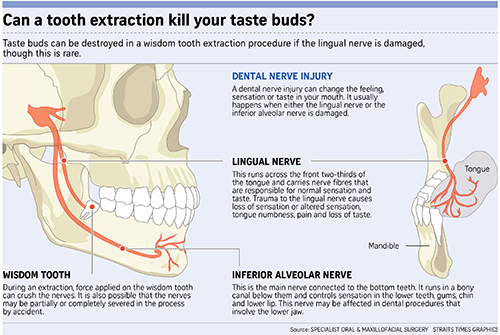
This article first appeared on The Straits Times on 9 September 2019 (Monday). We have reproduced it for the information of those of you who missed it when it was published.
A botched wisdom tooth removal is not commonly heard of but it can kill taste, sensation in the mouth and even affect speech, say experts.
Last week, a former head chef whose taste buds were compromised following a botched wisdom tooth extraction was awarded $105,000 for job loss, pain and suffering.
The Australian, who resigned from the restaurant Tippling Club in Singapore in late 2015, had gone to see a dental specialist in orthodontics for the procedure in 2013. Complications arose during the procedure as his tooth could not be extracted.
He was later found to have sustained a serious injury to the right lingual nerve, which led to him being unable to taste or discern texture or temperature in the right side of his tongue.
While such an injury can happen, it is not common.
Clinical Associate Professor Andrew Tay, a senior consultant and the head of the Department of Oral and Maxillofacial Surgery at the National Dental Centre Singapore said that surgery to remove impacted lower wisdom teeth carries the risk of post-operative bleeding, pain, infection and injury to two nerves – either the inferior alveolar nerve or the lingual nerve.
The inferior alveolar nerve supplies sensation to the lower lip and chin, while the lingual nerve supplies sensation to the tongue, floor of mouth and inner lower gums.
Dr Tay said the incidence of tongue numbness – which affects the sense of taste as in the case of the chef – has been reported to be 0.7 per cent to 11.5 per cent of cases at the one-week mark after the surgery.
A year after the surgery, the incidence is put at 0 per cent to 0.5 per cent, Dr Tay pointed out.
The nerve that provides the taste sensation to our brain is called the chorda tympani, and its fibres are carried by the lingual nerve,” he said.
“If the lingual nerve is damaged, it is likely that the taste fibres are also damaged.”
Besides loss of taste, a lingual nerve injury, on either the right or left side can result in loss of sensation in that same side of the tongue, floor of mouth and inner gums of the lower jaw.
Patients with lingual nerve injury can experience varying degrees of altered sensation such as numbness, swelling, tingling, pricking sensations. They can also have difficulty locating food in the affected side of the mouth and sometimes experience impediment in speaking certain words, said Dr Tay.
They may also complain of accidentally biting their tongues on the affected side when eating, he said.
“Nerve injuries are uncommon and in a minority of cases, may be partly contributed by an individual’s lingual nerve being positioned abnormally close to the wisdom tooth,” said Dr Tay.
Also, nerve injuries that result from a wisdom tooth removal are usually temporary.
Tongue numbness is a known risk of wisdom tooth removal, said Dr Matthew Sng, the honorary secretary of the College of General Dental Practitioners.
“Of all the patients who experience numbness – either in the lower lip and chin, or the tongue – after a wisdom tooth extraction, the vast majority will regain their sense of taste or sensation after six months to a year.”
Dr Ho Kok Sen, an Oral & Maxillofacial Surgeon at Specialist Dental Group said the incidence of injury to the inferior alveolar nerve – which leads to lip numbness – after a wisdom tooth extraction is about 0.35 to 8.4 per cent.
The incidence of injury to the lingual nerve after a wisdom tooth extraction is about 1 to 3 per cent, he said.
To avoid this risk, a proper assessment, which involves a clinical and radiographic examination by a dentist or dental specialist, is required, said Dr Ho.
A radiographic examination will include a full mouth dental x-ray and in some cases, CT (cone beam computed tomography) scan, he said.
“From the assessment, a diagnosis will be established where the level of complexity will be ascertained,” said Dr Ho.
“Based on the percentage of risk to nerve injury, it will be decided on whether a general dentist can carry out the wisdom teeth removal procedure or if the patient should be referred to an oral surgeon,” he said.
Wisdom tooth removal is mostly done by general dentists or a dental specialist in oral and maxillofacial surgery, though some other dental specialists may also carry out the procedure.
Complicated wisdom tooth cases require the expertise of an oral surgeon but most cases are not complicated and can be handled by a general dentist, said Dr Sng.
“In most cases, patients can go to a dentist or dental specialist for a wisdom tooth procedure as long as the dentist or specialist is confident and experienced in doing such a procedure and explains to you the risks and benefits of doing it.”





